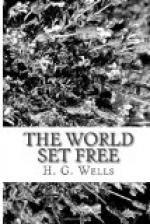Barnet seems to have spent the morning in rescue work along the track of the canal, in helping people who were adrift, in picking up derelict boats, and in taking people out of imperilled houses. He found other military barges similarly employed, and it was only as the day wore on and the immediate appeals for aid were satisfied that he thought of food and drink for his men, and what course he had better pursue. They had a little cheese, but no water. ‘Orders,’ that mysterious direction, had at last altogether disappeared. He perceived he had now to act upon his own responsibility.
’One’s sense was of a destruction so far-reaching and of a world so altered that it seemed foolish to go in any direction and expect to find things as they had been before the war began. I sat on the quarter-deck with Mylius my engineer and Kemp and two others of the non-commissioned officers, and we consulted upon our line of action. We were foodless and aimless. We agreed that our fighting value was extremely small, and that our first duty was to get ourselves in touch with food and instructions again. Whatever plan of campaign had directed our movements was manifestly smashed to bits. Mylius was of opinion that we could take a line westward and get back to England across the North Sea. He calculated that with such a motor barge as ours it would be possible to reach the Yorkshire coast within four-and-twenty hours. But this idea I overruled because of the shortness of our provisions, and more particularly because of our urgent need of water.
’Every boat we drew near now hailed us for water, and their demands did much to exasperate our thirst. I decided that if we went away to the south we should reach hilly country, or at least country that was not submerged, and then we should be able to land, find some stream, drink, and get supplies and news. Many of the barges adrift in the haze about us were filled with British soldiers and had floated up from the Nord See Canal, but none of them were any better informed than ourselves of the course of events. “Orders” had, in fact, vanished out of the sky.
’"Orders” made a temporary reappearance late that evening in the form of a megaphone hail from a British torpedo boat, announcing a truce, and giving the welcome information that food and water were being hurried down the Rhine and were to be found on the barge flotilla lying over the old Rhine above Leiden.’ . . .
We will not follow Barnet, however, in the description of his strange overland voyage among trees and houses and churches by Zaandam and between Haarlem and Amsterdam, to Leiden. It was a voyage in a red-lit mist, in a world of steamy silhouette, full of strange voices and perplexity, and with every other sensation dominated by a feverish thirst. ‘We sat,’ he says, ’in a little huddled group, saying very little, and the men forward were mere knots of silent endurance. Our only continuing sound was the persistent mewing of a cat one of the men had rescued from a floating hayrick near Zaandam. We kept a southward course by a watch-chain compass Mylius had produced....




